
Glasnik Hemicara i Tehnologa Bosne i Hercegovine
Scope & Guideline
Exploring the Frontiers of Chemistry and Technology
Introduction
Aims and Scopes
- Corrosion Science and Protection:
Research on the corrosion properties of various materials, including metals and alloys, in different chemical environments, focusing on both theoretical and applied aspects of corrosion inhibition. - Environmental Chemistry:
Studies investigating the presence and effects of heavy metals and other pollutants in natural resources such as water, soil, and biological samples, with an emphasis on ecological impacts and remediation strategies. - Natural Products and Their Applications:
Exploration of the chemical properties and biological activities of natural compounds, including essential oils and plant extracts, assessing their potential uses in pharmaceuticals and food industries. - Analytical Chemistry Techniques:
Development and validation of analytical methods for the detection and quantification of various substances in complex matrices, including water and biological samples, ensuring reliability and accuracy in environmental monitoring. - Food Chemistry and Safety:
Analysis of food products for nutritional content, contaminants, and additives, focusing on the safety and health implications of dietary components. - Education in Chemistry:
Research related to pedagogical approaches in chemistry education, addressing cultural and linguistic diversity in teaching methodologies and their effectiveness.
Trending and Emerging
- Green Chemistry and Sustainable Practices:
There is an increasing focus on environmentally friendly alternatives to traditional chemical processes, as evidenced by research on hydrophobic solvents and other green methodologies. - Bioactivity and Health Implications of Natural Products:
Research on the health benefits and bioactivity of natural compounds, including antioxidants and essential oils, is trending, reflecting a broader interest in natural remedies and food safety. - Advanced Analytical Methods for Environmental Monitoring:
Emerging trends show a growing application of sophisticated analytical techniques in environmental science, particularly for assessing pollutants and ensuring compliance with safety standards. - Chemistry Education Research:
There is a noticeable increase in studies addressing the pedagogical aspects of chemistry teaching, particularly in diverse educational contexts, indicating a commitment to improving educational practices. - Interdisciplinary Approaches in Chemical Research:
An emerging trend is the integration of chemistry with other fields, such as biology and environmental science, to tackle complex research questions and societal challenges.
Declining or Waning
- Traditional Chemical Synthesis:
Research focusing on classical synthetic methods has decreased, possibly due to a growing emphasis on greener and more sustainable alternatives in chemical processes. - Industrial Chemistry Applications:
Papers related to large-scale industrial applications of chemical processes have become less frequent, indicating a shift towards more research-oriented and academic explorations rather than practical industrial applications. - Toxicological Studies on Common Pollutants:
While toxicological research remains significant, specific studies on commonly known pollutants are becoming less frequent, possibly due to saturation in this area and a move towards novel contaminants.
Similar Journals

Revista Virtual de Quimica
Exploring Innovative Frontiers in Chemical SciencesRevista Virtual de Quimica, published by the SOC BRASILEIRA QUIMICA, is a dynamic online journal based in Brazil, dedicated to promoting innovative research in the field of chemistry and related disciplines. Established in 2011, the journal has made significant strides in contributing to the academic landscape, receiving an impact factor that highlights its relevance, although it currently holds a Q4 quartile ranking in the miscellaneous category of Chemistry and Mathematics as of 2023. The journal is committed to open access, ensuring that scholarly articles are readily available to researchers, professionals, and students worldwide. Its focus encompasses diverse areas within general chemistry, aiming to foster knowledge sharing and collaboration among the scientific community. By providing a platform for high-quality research publications, Revista Virtual de Quimica stands as an essential resource for advancing chemical sciences and encouraging interdisciplinary studies.
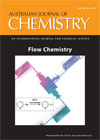
AUSTRALIAN JOURNAL OF CHEMISTRY
Pioneering discoveries in diverse chemical disciplines.The Australian Journal of Chemistry, with an ISSN of 0004-9425 and an E-ISSN of 1445-0038, is a distinguished publication from CSIRO PUBLISHING, dedicated to advancing the field of chemistry since its inception in 1948. Based in Australia, this journal serves as a platform for original research articles, reviews, and innovative studies that encompass a wide spectrum of chemical disciplines, aiming to foster communication and collaboration among researchers globally. Despite its Q3 ranking in the Chemistry (Miscellaneous) category and standing at rank #236 in Scopus’ general chemistry classification, it remains an essential resource for professionals and students seeking to stay informed about emerging trends and discoveries in chemistry. The journal does not offer open access, emphasizing the premium quality of peer-reviewed content that adheres to rigorous academic standards. By bridging theory and practice, the Australian Journal of Chemistry continues to play a crucial role in shaping the future of chemical sciences.
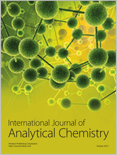
International Journal of Analytical Chemistry
Elevating Knowledge in Analytical Techniques GloballyInternational Journal of Analytical Chemistry, published by HINDAWI LTD, is a leading open access platform that has been advancing the field of analytical chemistry since its inception in 2009. With an ISSN of 1687-8760 and an E-ISSN of 1687-8779, this journal is headquartered in Egypt and serves a global audience, publishing high-quality research and reviews that explore innovative methodologies, techniques, and applications in analytical chemistry. Ranked in the Q3 quartile, the journal holds a notable position within its category, specifically at #90 out of 156 in the Scopus ranks for Analytical Chemistry, showcasing its impact within the scientific community. Researchers, professionals, and students can access a wealth of knowledge freely, as the journal promotes open access to facilitate the dissemination of critical research innovations. By bridging the gap between theoretical advancements and practical applications, the International Journal of Analytical Chemistry continues to play a pivotal role in shaping the future of analytical practices.
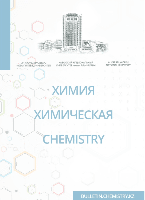
Chemical Bulletin of Kazakh National University
Bridging Discoveries: Chemistry for a Global CommunityThe Chemical Bulletin of Kazakh National University is a prominent open-access journal dedicated to advancing the field of chemistry. Published by AL-FARABI KAZAKH NATIONAL UNIVERSITY, this journal serves as a vital platform for disseminating original research, reviews, and innovative findings in diverse areas of chemistry since its transition to open access in 2012. With an ISSN of 1563-0331 and an E-ISSN of 2312-7554, the journal aims to reach a global audience, fostering knowledge exchange among researchers, professionals, and students in the scientific community. The publication seeks to promote high-quality research that contributes to the understanding and application of chemical sciences, particularly in the context of Kazakhstan and the broader Central Asian region. Given the journal's commitment to making research freely accessible, it stands as an invaluable resource for anyone engaged in the study and application of chemistry.

Analytical and Bioanalytical Chemistry Research
Exploring Innovations in Chemical Analysis.Analytical and Bioanalytical Chemistry Research is an esteemed open-access journal published by the Iranian Chemical Society, dedicated to the advancement of knowledge in the fields of analytical chemistry, biochemistry, and spectroscopy. Since its inception in 2014, this journal has provided a platform for researchers, professionals, and students to publish and access high-quality research articles that contribute to the understanding of chemical analysis and bioanalytical methods. With an ISSN of 2383-093X and an open-access model that promotes global dissemination of findings, it ensures that innovative research reaches a broad audience. The journal has consolidated its presence in the scientific community, currently ranked in quartile Q4 for analytical chemistry, biochemistry, and spectroscopy as of 2023. Its Scopus rankings, including a percentile of 34th in Analytical Chemistry, reflect its commitment to quality research and scholarly contribution. Situated in Tehran, Iran, the journal serves as a vital resource for academic discourse, offering insights into emerging trends and methodologies in analytical and bioanalytical chemistry.

Progress on Chemistry and Application of Chitin and its Derivatives
Advancing Chitin Research for Innovative ApplicationsProgress on Chemistry and Application of Chitin and its Derivatives is an esteemed journal that focuses on the multifaceted aspects of chitin and its derivatives, showcasing pioneering research in the fields of Biochemistry and Organic Chemistry. Published by Polish Chitin Society and operating under an open access format, this journal aims to disseminate high-quality research findings and innovative applications related to chitin chemistry, promoting the exchange of knowledge among researchers, professionals, and students worldwide. With a commitment to advancing the understanding of biopolymer science, the journal has been active since 2012 and is recognized for its contributions to the field despite its current classification in the Q4 quartile for both categories. Researchers will find a platform that not only highlights the latest advancements but also integrates interdisciplinary approaches to explore the potential of chitin in diverse applications. For those interested in the chemistry and application of biopolymers, this journal represents an essential resource that promises to drive future innovations and collaborations in the field.

Brazilian Journal of Analytical Chemistry
Elevating Research Standards in Brazilian ChemistryBrazilian Journal of Analytical Chemistry, published by VISAO FOKKA COMMUNICATION AGENCY, serves as a vital platform for those engaged in the field of analytical chemistry, especially within the Latin American context. With an ISSN of 2179-3425 and an E-ISSN of 2179-3433, this journal aims to promote high-quality research and advancements in analytical methodologies, instrumentation, and applications spanning from 2010 to the present. Although it currently holds a Q4 rank in Analytical Chemistry by Scopus and is placed at the 24th percentile, its commitment to open access publishing provides invaluable opportunities for widespread dissemination of knowledge, catering to researchers, professionals, and students alike. The journal's editorial board comprises emerging and established experts aiming to bridge gaps in analytical chemistry research, particularly in a Brazilian and broader South American context. Situated in São Paulo, Brazil, the journal's role in fostering innovation and collaboration in analytical techniques makes it an essential resource for the academic community.
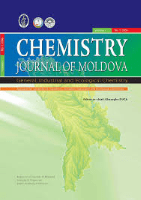
Chemistry Journal of Moldova
Empowering Researchers: Share, Discover, and Innovate in ChemistryChemistry Journal of Moldova is a pioneering open-access journal dedicated to fostering the dissemination of significant research in the diverse fields of chemistry, including Environmental Chemistry, Process Chemistry and Technology, and more. Published by the esteemed Academia Sciences Moldova, Institute of Chemistry, this journal has been at the forefront of scientific inquiry since its establishment in 2006. With an ISSN of 1857-1727 and a digital presence through its E-ISSN of 2345-1688, it provides an accessible platform for researchers, students, and professionals to share and engage with cutting-edge findings. Although currently ranked in the Q4 quartile in several chemistry categories, the journal is committed to improving its impact within the academic community and aims to highlight emerging trends and technologies in the chemistry domain. The journal's office is located at 3 Academiei Str, Chisinau MD-2028, Moldova. As it converges its publication years from 2016 to 2024, the Chemistry Journal of Moldova invites all contributors and readers to explore its rich repository of research that bridges innovative ideas to practical applications.
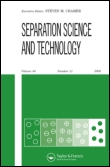
SEPARATION SCIENCE AND TECHNOLOGY
Connecting Scholars in the World of Separation ScienceSEPARATION SCIENCE AND TECHNOLOGY is a distinguished journal published by Taylor & Francis Inc, offering critical insights and advancements in the fields of chemistry and chemical engineering. With an ISSN of 0149-6395 and E-ISSN of 1520-5754, the journal spans a rich history from 1978 to 2024, providing a platform for scholarly articles that delve into innovative separation processes and technologies. Notably recognized in the 2023 category quartiles, the journal ranks Q2 in Chemical Engineering and Chemistry, alongside Q3 in Filtration and Separation and Process Chemistry and Technology, reflecting its significant impact and relevance in these research areas. With an impressive Scopus ranking, including a rank of #10/19 in Filtration and Separation, SEPARATION SCIENCE AND TECHNOLOGY is crucial for researchers and professionals seeking to enhance their understanding of separation techniques and applications. Although it operates under a subscription model, its contributions remain indispensable for the advancement of knowledge and technologies in separation science.

Jordan Journal of Chemistry
Advancing Chemistry: Bridging Local Insights with Global Impact.The Jordan Journal of Chemistry is a prominent publication dedicated to advancing the field of chemistry in Jordan and beyond. Published by the Yarmouk University Deanship of Research & Graduate Studies, this journal serves as a platform for researchers, educators, and practitioners to disseminate their findings in a variety of chemistry sub-disciplines. Although currently classified in Q4 of miscellaneous chemistry and ranking within the 9th percentile according to Scopus, the journal plays a crucial role in fostering academic dialogue and collaboration in the region. With its ISSN 1814-9111 and E-ISSN 2079-7249, the Jordan Journal of Chemistry offers open access to researchers from diverse backgrounds, ensuring that critical research is both accessible and impactful. By bridging local studies with global scientific advancements, this journal is poised to contribute significantly to the growth and recognition of chemistry as a key scientific discipline in the region, with convergence efforts set from 2020 to 2024.